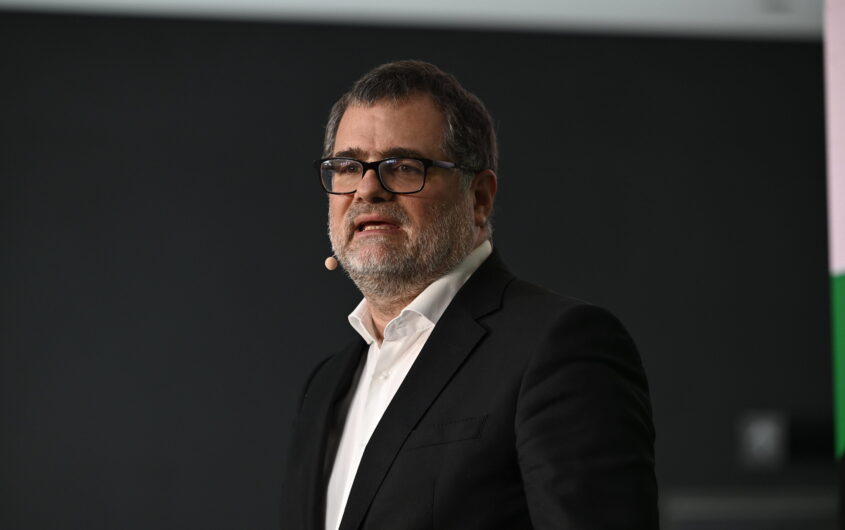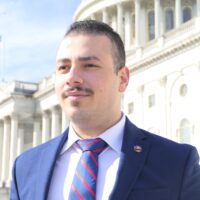
Hubert Burda Media via Flickr
AGI Profiles: Wolfgang Schmidt

Martin Makaryan
Halle Foundation/AGI Intern
Martin Makaryan is a research intern at AGI in fall 2023. He assists resident fellows with their research projects, manages databases, and provides administrative and logistical support for AGI's events and programs. Mr. Makaryan is a master's student at the Johns Hopkins University School of Advanced International Studies (SAIS) where he specializes in security and strategy with a regional focus on Europe and Eurasia. At SAIS, he serves as the Eurasia Chair of the Europe & Eurasia Club and is a Staff Writer for the SAIS Observer. Prior to SAIS, he worked in government relations and non-profits and has written on foreign policy issues and European affairs for various publications. His areas of expertise include NATO and transatlantic relations, European security, Russia, and the post-Soviet space. He holds a Bachelor of Arts from the University of California, Los Angeles (UCLA).
Head of the Federal Chancellery and Federal Minister for Special Tasks
Wolfgang Schmidt, dubbed by some as Chancellor Olaf Scholz’s “shadow foreign minister,” has been serving as the Head of the Federal Chancellery and Federal Minister for Special Tasks since December 2021. The head of the Federal Chancellery oversees the coordination of activities of the federal government and works closely with the chancellor to ensure the smooth administrative functioning of the Federal Chancellery. As Federal Minister for Special Tasks, Wolfgang Schmidt oversees the federal intelligence agencies and acts as the political liaison between the chancellor and the intelligence services, placing him in a uniquely important position in terms of national security and foreign policy strategy and execution.
Federal Minister Wolfgang Schmidt was born in Hamburg in 1970, the city where Chancellor Olaf Scholz grew up and began his political career. He joined the Social Democratic Party (SPD) when he was 19. Before becoming professionally involved in politics, Schmidt studied law in Hamburg and in Bilbao, Spain. Since the early 2000s, Schmidt’s political trajectory and rise in German politics have been closely intertwined with Olaf Scholz. Schmidt was chief of staff to Scholz when he was Federal Minister of Labor and Social Affairs from 2007-2009 and State Secretary when Scholz was Federal Minister of Finance from 2018-2021 during Angela Merkel’s chancellorship.
His role and influence on Germany’s foreign policy and national security policy are thus often attributed to this close personal relationship with Chancellor Olaf Scholz, cultivated throughout the past decades during their close work in Hamburg, the party, and the federal government. According to Markus Töns, a senior lawmaker from the SPD, “Schmidt is the most important person after Scholz because the chancellor trusts him so closely, listens to his opinion, and entrusts him with so many tasks.”
Schmidt has had a significant impact on German foreign policy, especially in Germany’s response to Russia’s ongoing invasion of Ukraine. He has been credited as the main architect behind Germany’s Zeitenwende, the strategic shift of German policy announced by Chancellor Scholz in the wake of the full-scale Russian aggression in February 2022. He staunchly defended Germany’s strategic policy transformation and support for Ukraine in a public appearance in October 2022. He was involved in the crucial negotiations with the U.S. government over the delivery of German Leopard-2 tanks to Ukraine. At that time, Schmidt was reported to have had a “tense” conversation with U.S. Secretary of Defense Lloyd Austin because the United States was dissatisfied with Germany’s publicly announced pre-conditions on the delivery of German tanks, which Germany eventually agreed to supply, once the United States provided political cover by agreeing to deliver its most advanced tanks to Ukraine as well.
Responding to criticism that the Zeitenwende has been slow, Schmidt once likened Germany to a “teenager” when it comes to foreign and security policy but asserted that the country under the new government has moved swiftly to provide weapons and security assistance to Ukraine. Schmidt’s track record shows a clear evolution toward a more ardent support for Ukraine and a strategic rethinking of Germany’s role and place in Europe’s security architecture. Schmidt met with Ukraine’s Foreign Minister Dmytro Kuleba just days before the German Foreign Minister Annalena Baerbock announced in November 2023 that Germany’s military support to Ukraine will be “massively expanded” in 2024.
Wolfgang Schmidt has played a key role in leading the direction of policy toward a more sustainable and coherent line based on the vision of Chancellor Olaf Scholz. Despite an initial rift between Foreign Minister Baerbock, a politician from the Green Party, who had accused the Chancellery of jeopardizing the foreign ministry’s position and authority over foreign policy matters, German foreign policy, especially its policy toward Russia and German support of Ukraine, has solidified significantly since the start of the conflict. Schmidt had publicly defended his role in an interview with Politico, stating that his job “is also to help ensure that the government as a whole functions smoothly and is in a good position.” The reality is that with an unwieldy coalition currently in power in Germany, such intragovernmental struggles are very common, given the record of other parliamentary democracies. This is especially true for today’s Germany where Chancellor Scholz’s objective is to ensure that the Chancellery has control over key questions in German foreign and national security policy. In this context and given his position, Schmidt is the official at the forefront of this inner struggle.








